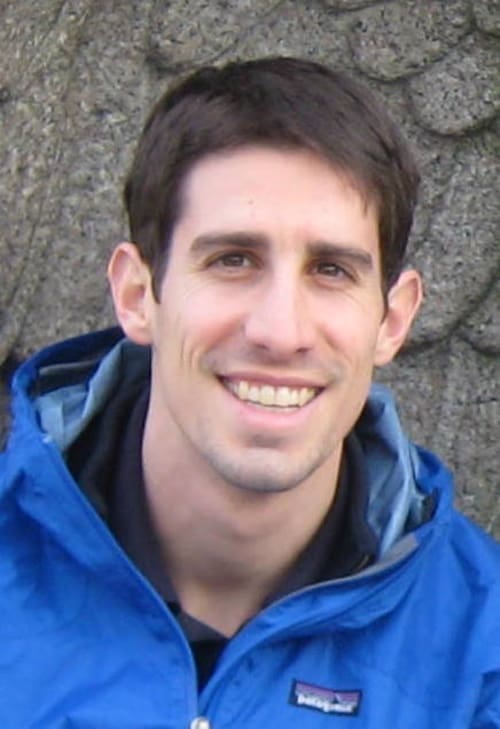 Graham Scharf is a father, the husband of a developmental pediatrician, a former NYC Teaching Fellow, and co-founder of Tumblon.com. He has worked in team development, taught in an urban public school, and is full-time dad to his eight- and three-year-old daughters. Graham spends most of his time cooking, reading, gardening, and exploring playgrounds, parks, libraries and museums with his daughters. He is the author of The Apprenticeship of Being Human: Why Early Childhood Parenting Matters to Everyone.
Graham Scharf is a father, the husband of a developmental pediatrician, a former NYC Teaching Fellow, and co-founder of Tumblon.com. He has worked in team development, taught in an urban public school, and is full-time dad to his eight- and three-year-old daughters. Graham spends most of his time cooking, reading, gardening, and exploring playgrounds, parks, libraries and museums with his daughters. He is the author of The Apprenticeship of Being Human: Why Early Childhood Parenting Matters to Everyone.
In your work, what are you creating, and what are you cultivating? (In Andy Crouch’s vernacular, what new culture are you making, and what good culture are you conserving and nurturing?)
Graham Scharf: I’m writing a short book called The Apprenticeship of Being Human: Why Early Childhood Parenting Matters to Everyone. In it, I am trying to present a simple, cogent argument for why the social sphere of family—particularly in early childhood—matters so much for the flourishing of other spheres, and for society at large.
In doing so, I am cultivating and conserving a rich historic tradition of family nurture within a vibrant network of family, friends, and neighbours. I’m leaning on the wise counsel of Augustine, who presents this argument in the City of God; Lesslie Newbigin, who said it even more clearly than Augustine; a vast array of contemporary neurological, educational, and economic research; and my own parents’ loving nurture.
Who is the “public” for your work—who is it for, and how does it affect the lives of those who engage with it?
My audience, my “public,” is my neighbours and fellow citizens. My book is especially relevant for parents, educators, and policy makers.
However, everyone is a neighbour and has neighbours. There is no one who is not a part of the web of relationships that compose neighbourhoods, communities, and society. Consequently no one is untouched by the dynamics of early childhood parenting and no one is entirely without influence.
My book offers a simple metaphor by which to understand the nature and importance of early learning. As such, it practically helps readers to consider how their actions contribute to—or militate against—the development of human virtue and social flourishing.
Why do you do what you do?
I write and work and love because I’m convinced by the experience of teaching in a high-needs school in NYC, by being a full time parent, and by researching the relevant literature that what happens in the earliest years of life establishes a trajectory for life: whether of virtue, love, and civic contribution; carelessness, indolence, and greed; or active, vicious social destruction (think August 2011 London riots). So I am passionately committed to helping parents, especially the most disadvantaged parents, to embrace and fulfill their responsibilities. I’m equally committed to the other social spheres supporting (rather than replacing) parents, so that each sphere is healthy and thriving.
What skills, proficiencies, and virtues does this work develop in you?
- Discipline. There is no good writing, or re-writing, without discipline.
- Perseverance. Writing is hard work. Writing well is even harder work. If you want to be a world-class cellist, you practice for hours a day. If you want to be a world-class writer . . . writing requires no less.
- Humility. One of my first readers (named one of the top 100 minds in personal development by Leadership magazine) told me, “I read this because I’m your friend, but I wouldn’t pick it up otherwise.” Wounds from a friend can be trusted. That piece of honest feedback transformed the book in both form and content.
- Confidence. As a writer, I must have the confidence that, by God’s grace, I have something to say that truly serves others. Then my writing and my work is not self-promotion but love. It is not about the success or failure of my book, but truly and deeply about caring that I create value. Indeed, I must create exceptional value so that my readers (1) happily sacrifice time doing other good things to read my book, (2) receive more help and satisfaction in the content than the price they paid for the book, and (3) find such value in the book that they gladly share with others.
What five books would you recommend to someone interested in understanding or pursuing the sort of work you do?
To understand the science of early childhood development, the landmark text is From Neurons to Neighborhoods. For a gripping book that shows how early nurture plays out (for good and for ill) in one community, Paul Tough’s book Whatever it Takes: Geoffrey Canada’s Quest to Change Harlem and America is fantastic, especially chapter 2, “Unequal Childhoods.”
In The Apprenticeship of Being Human, I argue that the Story into which we initiate our children shapes their character from the earliest years. Robert Coles has written the literary magnum opus in this field: The Call of Stories: Teaching and the Moral Imagination. Gladys Hunt has, in my opinion, written the most inspiring, practical guide for parents in Honey for a Child’s Heart: The Imaginative Use of Books in Family Life.
Finally, I would recommend Lesslie Newbigin’s Foolishness to the Greeks: The Gospel and Western Culture. His central question is this: What would be involved in a genuinely missionary encounter between the gospel and modern, western culture? The Apprenticeship of Being Human is my humble attempt to answer that question, within one particular sphere.
What do you do for fun?
I love to spend time with loved ones: friends and family. As a family, we daily read together, play outdoors, cook together, and eat together. We have a steady stream of guests in our home, both local friends and out-of-town houseguests. Together we enjoy the outdoors: hiking, biking, swimming, and gardening. We also spend much time indoors: playing Bananagrams, building with Legos, reading children’s books, and, yes, cooking and eating!
I’m also privileged to be part of a local start-up called the Charlottesville Business Initiative that seeks to help Christians steward their vocations well for the good of our community and the glory of God. I’m very excited to participate in the renewal and new ventures that sprout up through this network. These folks keep me thinking, praying, working, and loving in ways that reflect the image of Christ to the world.


